Editor’s Note: We’ve recently learned that the famous Dr. Ho has passed away. As a tribute, we’re re-running this story about his Chinese herbal medicine and the secret sauce we could all use in our lives.
***
When you see a Western couple walking around a small Chinese village with what looks like a bag of marijuana, you can’t help but notice.
“What you got there?” my husband asked as we passed a ruddy man and his wife in the one-street town of Baisha, in the Himalayan foothills of Yunnan Province.
“Dr. Ho? What? You’ve never heard of Dr. Ho?”
“Oh this?” said the man—who turned out to be from the Netherlands—lifting the clear plastic bag. “I’m not sure, but I hope it’s legal.” After some chuckles, he pointed to a concrete building about 100 yards away. “It’s from Dr. Ho.” He must have observed our blank faces. “Dr. Ho?” he asked. “What? You’ve never heard of Dr. Ho?”
He went on to explain that the then-90-year-old Dr. Ho Shixiu runs the Jade Dragon Snow Mountain Chinese Herbal Medicine Clinic and has been helping people cure ailments as serious as cancer for decades. “My wife has arthritis in her arm, and he gave her some of this to massage into her elbow and also to drink as tea.”
Mystical Man with the Secret to Life?
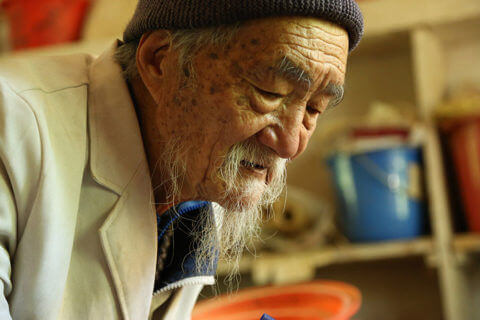
We were in China on vacation with our sons and had come to Baisha on bicycles from a nearby city. Merely out to explore the countryside, we had no idea we were in a Mecca for infirm pilgrims. But this Dr. Ho sounded like some mystical old man on a mountaintop who knew the meaning of healthy life, and, having ailments of our own, we certainly were not going to miss out on a chance like this.
On the day we heard about Dr. Ho, I happened to be in a stretch of particularly bad insomnia.
In the past couple of years, with middle age upon us, my husband and I have recommitted ourselves to exercise and healthy eating. We work out six days a week and are semi-vegetarians, but certain problems we just can’t shake. My husband just hadn’t had the energy he had even a year ago. He’d gone to a conventional doctor in our hometown of Austin, and after blood work and a stress test, no one could find anything wrong.
I had the opposite problem. Since my mid-30s, I’ve been plagued on and off by insomnia. I took homeopathic medicine—essentially chamomile in pill form—but sometimes, especially when traveling, that wasn’t enough. On the day we heard about Dr. Ho, I happened to be in a stretch of particularly restless nights.
Read More: A Woman Who Makes Another Type of Discovery in Asia
Finding Dr. Ho
After being assured by the Dutch couple that we didn’t need an appointment with Dr. Ho, we scooted to his clinic. Inside, we found three Chinese visitors crowded around a doorway to Dr. Ho’s office, listening in on a consultation. The walls of the waiting room were lined with framed newspaper articles and letters of thanks in a variety of languages. In the plastic chairs sat two Western couples; one from Rome. “I have a friend who is bipolar, and he gave her something that made her much better,” the Italian wife told me.
Soon it was the Italians’ turn, and we now moved close enough to Dr. Ho’s office so that I could hear him clearly but still couldn’t see him.
“How many babies do you have?” he asked the Italian woman in English that was accented but surprisingly good. (He’d learned his English when training at a U.S. Military Hospital in the 1930s and from a famous botanist, Joseph Rock, who’d lived in the area before World War II.) Then they moved on to her troubles—stomach problems and a backache. “I will give you herbs to drink and to rub on your back.”
The Italian husband complained of dry eyes. “You’ll take two grams of what I gave your wife, OK?” Dr. Ho said. “And I’ll show you pressure points for massage to help your eyes.” Through the open door, I saw a pair of old hands pointing to body parts on a small plastic model of a human torso.
Our Turn
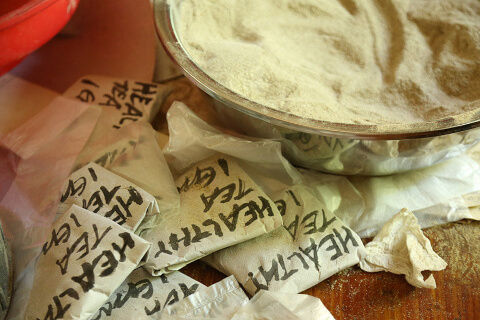
Finally Dr. Ho was ready for us. Seated at a long wood table surrounded by shelves of dried herbs was a man who was in every way what you wanted an old sage to look like. He was wearing a white lab coat and a gray knit cap, pulled down above age spots and bushy eyebrows, which were the same color gray as his unruly goatee. His eyes were dark and kind as he greeted us with a genteel bow. Later I read that the writer Bruce Chatwin described him in his book What Am I Doing Here? as having the “amused, slightly otherworldly air of a Taoist gentleman-scholar.”
After I sat down, he took my wrist so that he could measure my pulse. (Reportedly, Chinese practitioners can tell much about health from the strength and speed of the pulse.) He then asked me to stick out my tongue—tongue analysis is another ancient Chinese diagnostic tool that supposedly reveals much about the condition of organs.
“Many Americans come here with diabetes, high blood pressure, arthritis, or they are overweight. You are very good.” I nodded, relieved that my pulse and my tongue hadn’t exposed something dire.
“Do you have a little bit of stomach trouble?”
“At times, yes.” I thought that was a pretty safe assumption being that we were travelers.
He then asked me to stick out my tongue—tongue analysis is another ancient Chinese diagnostic tool that supposedly reveals much about the condition of organs.
“Do you have insomnia?”
“Yes, actually I do. That’s why I came in.”
It was his turn to nod. “Many doctors will give you pills for insomnia. I will give you something with no side effects. I will give you a tea. You drink it three times a day. And you know, no alcohol and no cigarettes, yes?”
“No cigarettes, yes I know,” I confirmed, but purposely avoided the subject of alcohol. I was on vacation after all.
“Be careful of what you put in your mouth, yes?” He patted me on the hand and bowed again. “Be happy, OK?” He shuffled to some barrels on the floor in back of his office, and scooped herbs into a red plastic bowl and later into a clear plastic bag.
Dr. Ho told my husband he was “strong like a horse,” and said he was going to give him some tea as well for his listlessness. He went to the back of his office again, and it seemed to me that he took herbs from the same barrel as he had taken mine.
“What are you giving us?” I asked.
“It is my own blend,” he replied, obviously not wanting to tell us more.
“Secret sauce number 80,” my husband joked.
The Stamp of Approval
Back at his table, he signed and dated two pieces of paper, then marked them with his own red-ink stamp before putting one in each bag. “This is for customs,” he explained. “So they know it is medicine.”
We had been told that Dr. Ho worked only for donations, so we slipped him 300 yuan ($48 dollars). He stood up as we went to leave. “Now I’m 90. I hope to see you in 10 years when I’m 100, I’m sure.” He bowed again. “I wish you peace and good health.”
“Do you think he gives the same tea for everything?” my husband asked.
My husband and I laughed when we were out on the street because our bags of gray powder identified us as Dr. Ho disciples.
“Do you think he gives the same tea for everything?” my husband asked. I shrugged, having wondered the same thing myself. I fished out the piece of paper inside to see if it revealed anything about the ingredients, but it contained only general health advice. “We work hard for the world and the future,” I began reading out loud. “To achieve successful treatment, patients must be confident in their own cure, optimistic in attitude, conduct their lives rationally … and apply both western and Chinese medicine where appropriate. Life and disease coexist, each moving in tandem. Optimism is the best medicine … Eat simply, live simply but above all be optimistic.”
“Well, it’s certainly works for Dr. Ho,” I said after I finished reading.
The Power of the Tea Leaves
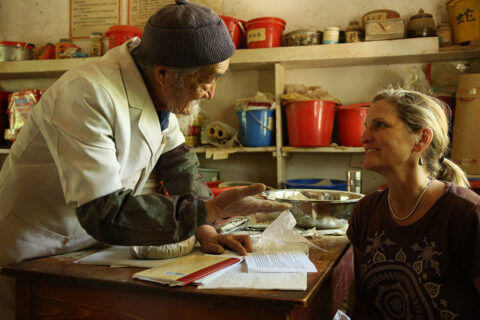
The first time we tried the tea, we both agreed it tasted terrible, but it was more palatable after we added honey and used a tea infuser to filter out the grittiness. We didn’t feel any effects immediately. I still was having fitful nights, but a week after our visit something turned. We were in Kyoto, Japan, by then, on the last leg of our Asia trip. We had rented a small traditional house, and I was worried that the set up—mattresses rolled out on a floor, with all four of us in the same room—would be disastrous for my sleep, but I couldn’t have been happier to be wrong. For our four days in Kyoto, I slept like a mummy—dreamy, delicious sleep.
Back home, I experienced little of the devastating jet lag that usually takes me a week to get over—especially after long flights moving from east to west. After a few weeks at home, my husband decided that Dr. Ho’s tea was working. He was back in his exercise routine but didn’t need short naps in the afternoon as he had before our trip. “I wonder if we can find out what’s in this?” he said one morning as we each drank our brew.
My Theory and I’m Sticking To It
“I don’t think it matters,” I said and then went on to explain the theory I’d been developing about Dr. Ho’s secret cure: “It has to be the most powerful placebo on Earth.” I explained that if you hear about Dr. Ho’s reputation for healing and cross continents to reach him and then you sit with this gentle old man in his office that smells of musty herbs in the shadow of the Himalayas and he tells you that his tea will help you and you look at how well he’s doing at 90, you’re going to believe it—that his tea is going to help with whatever ails you. It’s your mind that’s doing the work, not the tea. He even spelled it out, I realized, on that paper he gave us, emphasizing the prime importance of optimism.
But still I drank it because I wanted to believe. And still I slept.
After six months, my Dr. Ho tea ran out, and I wrote him at the email he gave us, requesting more. Who wants to mess with a good thing?
I never heard back. Someone suggested going to a Chinese medicine clinic in the States, but I don’t think it would be the same. I prefer the mystery and magic of Dr. Ho in far-off lands. I’ve suffered through other bouts of insomnia since and tried other measures (such as hypnosis) that have helped. Through it all—even on the most restless nights—I’ve tried to cling to the idea that optimism is the best medicine. It’s something of a mantra for me. And I’ve always found my way back to calm stretches of good sleep. Xie xie, Dr. Ho.
Read More: How Walking the Camino de Santiago Changed My Life
All photos by Robb Kendrick
A version of this story was originally published in November 2017.

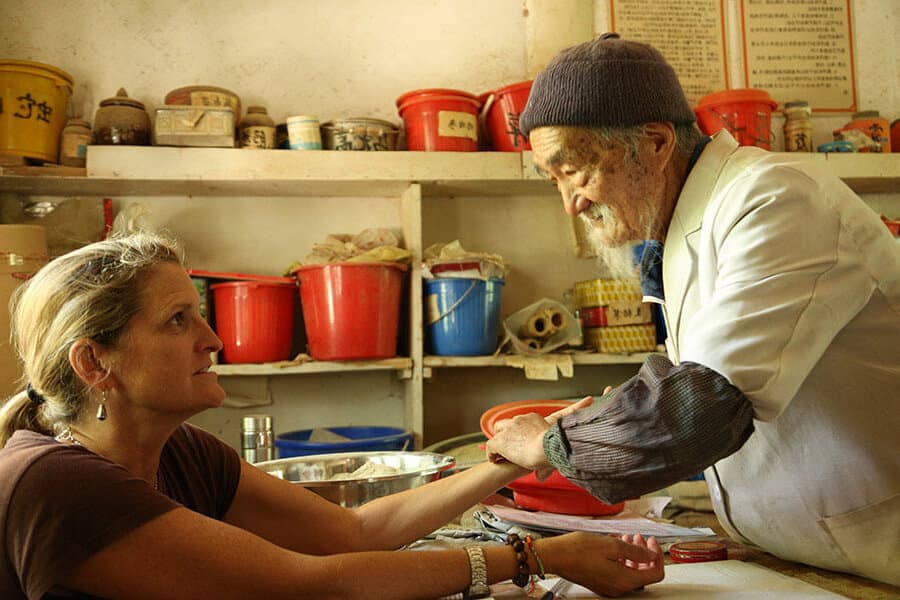




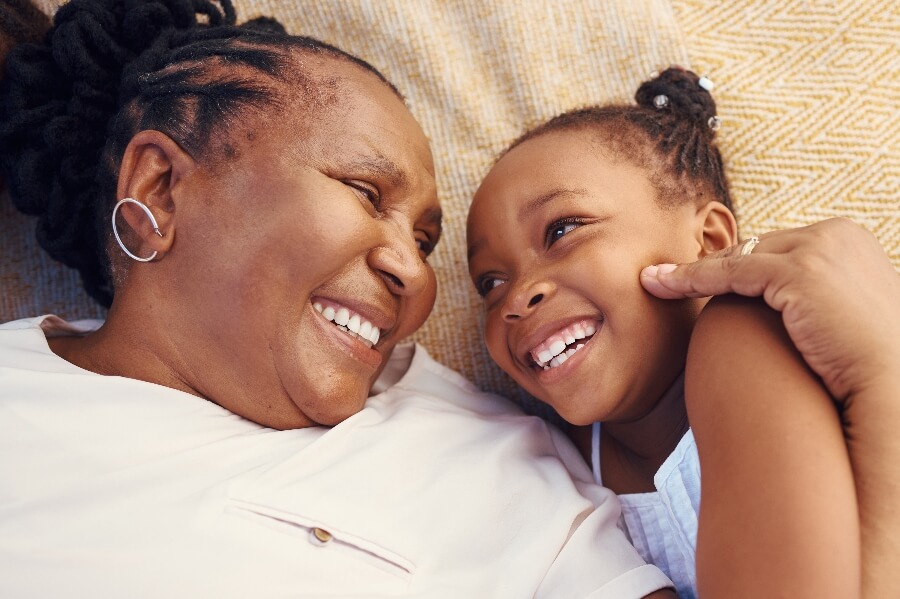














0 Comments